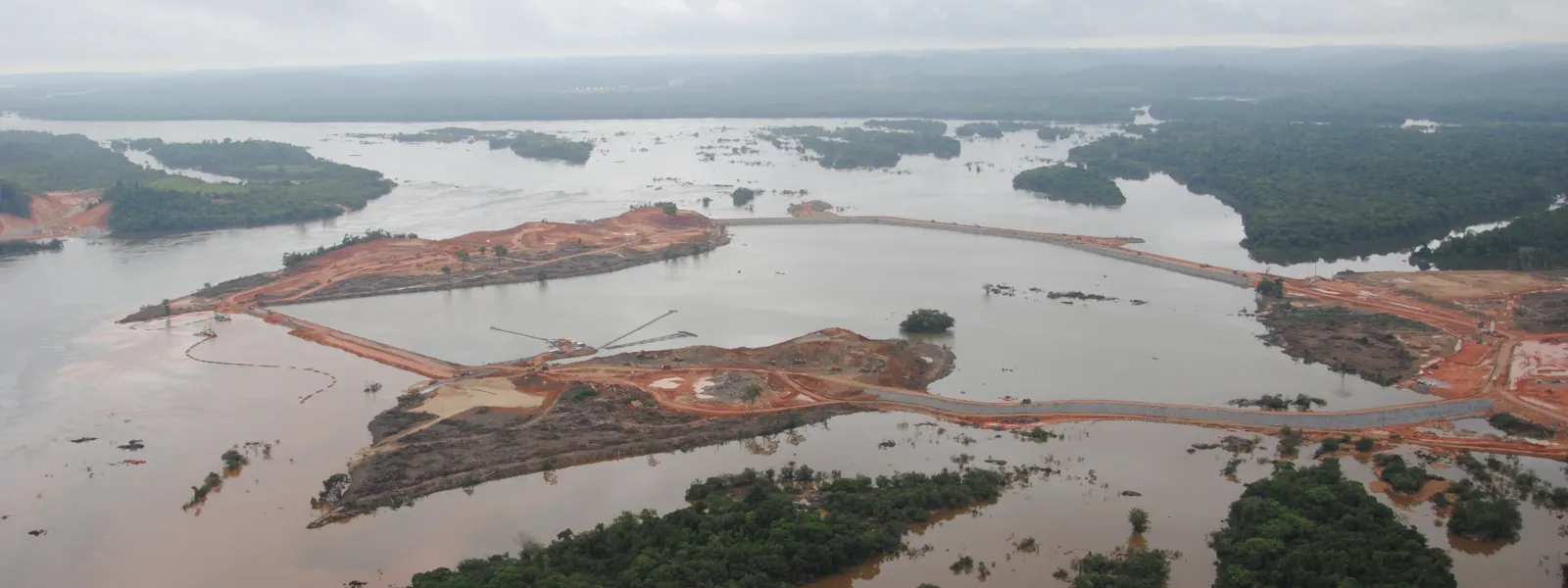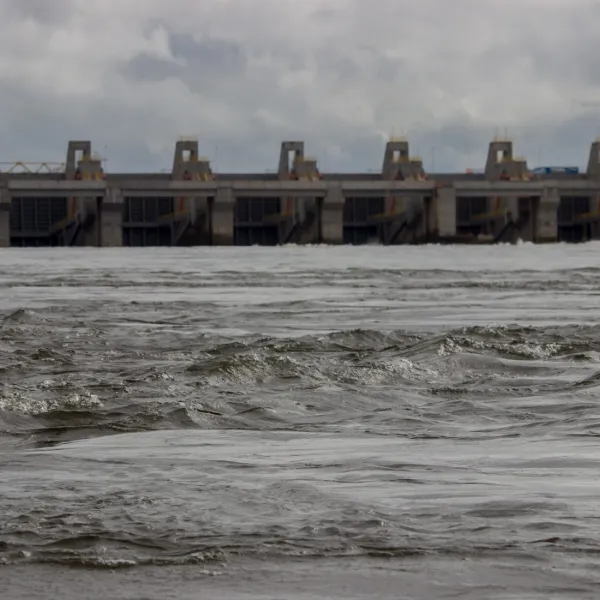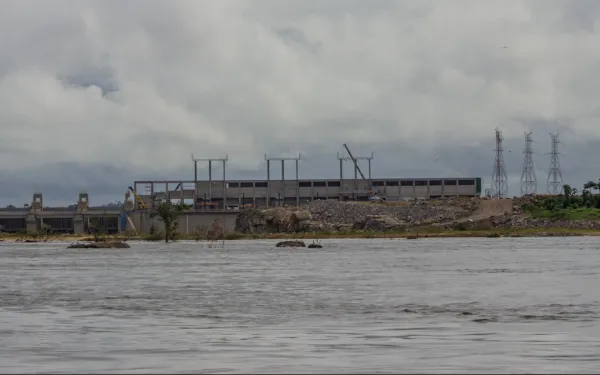
Project
Programa de Aceleração do CrescimentoHalting the implementation of large dams in the Americas
The more we learn, the clearer it becomes that large dams are unsustainable energy sources.
From the Mexican highlands to the Amazon River basin, hydroelectric mega-projects are aggravating climate change, destroying sensitive ecosystems, and threatening human rights and indigenous cultures.
In October 2016, a research study from Washington State University found that the world’s reservoirs generate 1.3 percent of all greenhouse gases (more than the total emissions of Canada!), confirming the damage dams do to our climate.
Large dams have no place on our rapidly changing planet. In a time of intensifying droughts, many vulnerable hydropower-dependent countries are facing energy shortages. And as extreme weather events increase around the world, the inherent danger of large dams becomes more evident.
Throughout the construction of Belo Monte, the world’s third largest dam, we’ve seen firsthand the grave impacts these projects have on the ecosystems in which they’re built. We’ve witnessed the violations they impose on the rights of indigenous and riverine communities, whose culture and livelihoods are tied so closely to the natural world.
Yet, across Latin America and the world, large dams are still being promoted as “clean and green” energy sources; and are even receiving support from national and international climate initiatives.
That support is part of the reason more than 3,700 large dams are currently being planned or constructed worldwide, more than 400 of which have been proposed for the vital Amazon River Basin.
At AIDA, we’re proud to be part of a team leading the fight against large dams across Latin America and beyond.
Partners:

Related projects

Open letter to the President of BNDES about funding for Belo Monte (Spanish only)
Excmo. Sr. Luciano Coutinho Presidente del Banco Nacional de Desarrollo Económico y Social – BNDES Río de Janeiro, Brasil Las organizaciones de la sociedad civil abajo firmantes, comprometidas con la defensa de los derechos humanos, el desarrollo con responsabilidad socioambiental y el fortalecimiento de la democracia, venimos respetuosamente a presentar las siguientes consideraciones y solicitar medidas urgentes ante el desembolso del préstamo anunciado por el BNDES para financiar el Complejo Hidroeléctrico de Belo Monte, en el Estado de Pará. Considerando que, de conformidad con la amplia documentación y estudios técnicos, existen fuertes evidencias de la inviabilidad económica del Complejo Belo Monte1, con base en factores como: i) el aumento constante de los costos del emprendimiento, que ya se multiplicó en casi 7 veces, de R$ 4.5 billones de reales en 2005 a R$ 19 billones en la época de la licitación en 2010, y actualmente está en aproximadamente R$ 28,9 billones conforme a datos del BNDES, pudiendo llegar a los R$ 32 billones, según analistas; ii) la reducida capacidad de generación de energía a lo largo de un año, aproximadamente apenas un 39% de su capacidad instalada de 11,2 mil MW; y iii) los verdaderos costos económicos asociados a la mitigación y compensación de impactos socioambientales que fueron crónicamente sub-dimensionados, en gran medida, a causa de presiones políticas por la aprobación de licencias ambientales, contrariando informes técnicos del propio IBAMA; Considerando que el BNDES firmó el 16 de junio de 2011 un primer préstamo puente por un valor de R$ 1,1 billones a favor del Consorcio Norte Energía S.A. (NESA), un segundo préstamo puente el 2 de julio de 2012 por un valor total de R$ 1,8 billones utilizando a la Caja Económica Federal (CEF) y al Banco ABC S.A. como prestamistas; y que el BNDES anunció el 26 de noviembre de 2012 la aprobación de un financiamiento por R$ 22,5 billones (el mayor préstamo de su historia) para Belo Monte, con la actuación del CEF y del BTG Pactual como bancos prestamistas de parte de los recursos,2 para sumar un total de R$ 25,4 billones; Considerando que los préstamos del BNDES a favor del consorcio Norte Energía están utilizando recursos públicos, oriundos del Programa de Integración Social y del Programa de Formación de Patrimonio del Funcionario Público (PIS-PASEP) y del Fondo de Garantía por Tiempo de Servicio (FGTS), asignados al Fondo de Amparo al Trabajador (FAT) y de la emisión de bonos del Tesoro Nacional en el mercado internacional (en los que la diferencia entre la tasa de interés pagada por Tesoro es aquella cobrada al BNDES y también cubierta por el contribuyente brasileño); Considerando que para la aprobación de los dos préstamos puente, por un valor total de R$ 2.9 billones, el BNDES exceptuó la realización de análisis de viabilidad económica y de clasificación de riesgo del Complejo Belo Monte, exigidos por la Resolución No. 2.682/99 de Consejo Monetario Nacional – CMN y no cumplió con las determinaciones de la Circular Nº 3547 de 07/07/2011/BACEN (D.O.U. 08/07/2011) en lo relativo a la necesidad de evaluación y cálculo de riesgo resultante de la exposición a los daños socioambientales del emprendimiento; Considerando que, a pesar de las determinaciones de las Resoluciones 2022/10 y 2025/10, aprobadas por la Dirección Ejecutiva, que instituyó la nueva Política de Responsabilidad Social y Ambiental y la nueva Política Socioambiental del Sistema BNDES, el Banco aún no cuenta con una guía socioambiental con directrices para orientar financiamientos para el sector hidroeléctrico, como herramienta para asegurar el cumplimiento de sus objetivos sociales, económicos y ambientales, en el marco de la legislación vigente; Considerando que el BNDES recibió notificaciones extra-judiciales firmadas por diversas organizaciones de la sociedad civil en octubre de 2010 y noviembre de 20113, con advertencias sobre los riesgos financieros, legales y de reputación a raíz de su involucramiento como financiador del Complejo Belo Monte; sin que eso haya provocado cambios efectivos en la postura del banco; Considerando el incumplimiento crónico de las condicionantes de las licencias ambientales (Licencia Previa No. 342/2010 y Licencia de Instalación No. 795/2011), como lo prueban las minutas del seguimiento de IBAMA y de la FUNAI, así como los relatos de organizaciones civiles y poblaciones afectadas, sin que eso haya afectado las decisiones del BNDES en cuanto al financiamiento de Belo Monte; Considerando las graves violaciones a los derechos humanos de los pueblos indígenas y de otras comunidades locales del Xingú y de la legislación ambiental, así como irregularidades en el cumplimiento de la legislación laboral por parte de NESA y empresas tercerizadas; Considerando los impactos socioambientales que la construcción de Belo Monte ya está provocando, como por ejemplo el desplazamiento forzado de agricultores familiares y ribereños sin compensación efectiva, afectación a la calidad del agua, mortalidad de peces y quelonios, aumento de la deforestación ilegal, invasión de tierras y explotación maderera ilegal, invasión de empresas mineras depredadoras (como la multinacional canadiense Belo Sun en la Volta Grande del Xingú), aumento de violencia y prostitución infantil, criminalización de defensores de derechos humanos en la región, así como la sobrecarga de los servicios de salud, saneamiento, educación y seguridad pública en áreas urbanas; sin medidas efectivas de solución a los problemas, en el ámbito de las condicionantes de licencias, el PDRS Xingú y las medidas cautelares solicitadas por la Comisión Interamericana de Derechos Humanos (CIDH); Considerando que el cuadro de ilegalidades de Belo Monte tiene como resultado, hasta el momento, la presentación de 15 acciones del Ministerio Público Federal, 21 acciones de la Defensoría Pública y 18 acciones de organizaciones de la sociedad civil; e internacionalmente la presentación de una petición y el otorgamiento de medidas cautelares por la Comisión Interamericana de Derechos Humanos en favor de las comunidades indígenas de la cuenca del Xingú; Considerando que el BNDES no posee hasta la fecha un sistema de monitoreo y evaluación del cumplimiento de condicionantes de licencias ambientales, de violaciones de derechos humanos y legislación ambiental y de otros impactos socioambientales de emprendimientos como Belo Monte, contradiciendo así el discurso de responsabilidad social y ambiental del banco; Considerando que un nuevo aporte de R$ 22,5 billones del BNDES, en el contexto actual de incumplimiento de obligaciones formales por parte de NESA, genera que el BNDES y otros órganos públicos intensifiquen enormemente los problemas de degradación ambiental y el sufrimiento de las poblaciones afectadas y amenazadas en la región afectada por Belo Monte; Solicitamos que no se realice ningún desembolso del préstamo de R$ 22,5 billones para Norte Energía S.A., anunciado el día 26 de noviembre de 2012 por el BNDES, antes de cumplir con las siguientes medidas urgentes, que constituyen, en su gran mayoría, obligaciones formales preexistentes del Banco: a) Demostración del pleno cumplimiento de las leyes nacionales e internacionales aplicables para hidroeléctricas y las directrices, criterios y demás compromisos del Protocolo de Intenciones para la Responsabilidad Socioambiental (Protocolo Verde) firmado por el BNDES en agosto de 2008; b) Esclarecimiento de los motivos para la inexistencia de una guía socioambiental con directrices para orientar inversiones en el sector hidroeléctrico, conforme a lo previsto en las Resoluciones 2022/10 y 2025/10 que instituyeran la nueva Política de Responsabilidad Social y Ambiental y la nueva Política Socioambiental del Sistema BNDES, así como una explicación sobre las medidas que el banco viene tomando y pretende implementar para que tales resoluciones sean cumplidas para el caso de Belo Monte; c) Criterios y métodos utilizados por el BNDES en el análisis de la viabilidad económica de Belo Monte - especialmente en lo que se refiere a los costos de construcción, producción y venta de energía, y costos de mitigación y compensación de impactos socioambientales – explicando los riesgos de perjuicios para las arcas públicas y el contribuyente brasileño y cómo el banco pretende sanearlos; d) Demostración de cumplimiento efectivo de la Resolución No. 2.682/99 del Consejo Monetario Nacional – CMN, relativa al análisis de viabilidad económica y de clasificación de riesgo del Complejo Belo Monte; e) Cumplimiento pleno de las determinaciones de la Circular Nº 3547 de 07/07/2011/BACEN (D.O.U. 08/07/2011) relativa a la necesidad de evaluación y cálculo de riesgo resultante de la exposición a los daños socioambientales del emprendimiento; f) Muestra de los análisis realizados por el BNDES respecto al grado de cumplimiento de condicionantes de licencias ambientales y sus implicaciones para la aprobación del préstamo principal; g) Esclarecimiento de los análisis realizados por el BNDES sobre el grado de cumplimiento de la legislación vigente en materia laboral y de derechos humanos, inclusive el derecho al consentimiento libre, previo e informado, conforme al artículo 231 de la Constitución Federal, el Convenio 169 de la OIT y la Declaración de los Derechos de los Pueblos Indígenas de las Naciones Unidas y las medidas cautelares otorgadas por la Comisión Interamericana de Derechos Humanos; h) Posicionamiento del BNDES sobre las más de 50 acciones interpuestas relativas a las ilegalidades en el licenciamiento e instalación del Complejo Belo Monte, y sus conclusiones en cuanto a las implicaciones del pasivo jurídico del emprendimiento para la aprobación del préstamo principal; i) Demostración de pleno cumplimiento del artículo 1, § 1º de la Ley 6.938/81, en lo que se refiere a la responsabilidad objetiva de los agentes financieros por los daños ambientales del emprendimiento, inclusive aquellos no previstos o asumidos en la Licencia Previa No. 342/2010. Señor Presidente, considerando la urgencia y relevancia de este asunto, inclusive para asegurar la coherencia entre los objetivos de responsabilidad social y ambiental del BNDES y sus operaciones en la práctica, solicitamos el máximo de atención y empeño en atender esta solicitud. En este sentido, solicitamos la realización de una reunión urgente de una delegación de las organizaciones signatarias de esta carta con Su Excelencia y su equipo, para tratar las cuestiones aquí planteadas y la implementación de las medidas urgentes propuestas. Altamira-PA, 4 de diciembre de 2012 See the full list of national and international organizations that signed the letter in the attached PDF version (spanish only).
Read more
The challenges of deploying wind energy in Mexico. The case of the Isthmus of Tehuantepec
To combat climate change, low-carbon projects such as wind farms must be promoted. But despite the urgency for renewable energy, these projects must be carried out in a sustainable and equitable fashion. This article is an open call to Mexico and the world to improve planning and development practices for renewable energy projects, helping to guarantee the respect of the human rights of affected communities. The Mexican government has authorized the development of at least 14 wind power projects on the Isthmus of Tehuantepec in Oaxaca, one of the poorest states in the country with a more than 34% indigenous population. The projects are backed by international investors including the Inter-American Development Bank and benefiting from the Clean Development Mechanism (CDM) of the Kyoto Protocol. Even so, a number of projects have caused negative social and environmental impacts that outweigh the benefits, threatening the human rights of local indigenous communities, including the right to free, prior, and informed consent for projects affecting their lands and livelihoods. The reason for this problem is that the Mexican government has not developed effective rules or mechanisms to regulate these investments. Without them, private companies have had to negotiate directly with local communities. There are other factors aggravating the situation, too: Locals lack information: Residents of the Isthmus of Tehuantepec say they have not received comprehensive and timely information about the projects. Some residents said in recent public forums that they were not told about the potential environmental impacts of the projects, such as those now affecting the possibility to cultivate their lands. Threats and violence against locals opposing the projects: For more than two years, the Jijot and Zapoteca communities have raised complaints about their leaders receiving threats and attacks by paramilitary groups and state officials seeking to silence any opposition to the development of wind farms. Lack of free, prior and informed consent: In the rush to grant permits and administrative permissions to wind power developers, the Mexican government has not fulfilled its obligation to consult local indigenous communities as guaranteed by international law. Unreasonable terms of land leases: A number of wind developers have signed contracts with local communities that offer paltry payments for the use of their land. Locals have complained about the lack of a process for negotiating on fair and equal terms. Absence of comprehensive and community-wide benefits: Some wind projects lack a comprehensive environmental and social development plan, meaning that they only benefit a fraction of the population: mostly investors and the companies that will buy the energy. While some locals have leased their lands at reasonable prices, the payments haven’t brought the promised development. Environmental impacts: Some projects have caused extensive environmental damage, yet studies to identify, prevent, and alleviate these damages have never been carried out. Impacts include the burning of large swaths of pastureland (a cause of greenhouse gas emissions), mangrove deforestation, and the destruction of migratory bird habitats. To mitigate the social and environmental impacts and avoid the violation of human rights during the development of wind farms, the following actions are suggested: Create a protocol for wind power development that guarantees the respect for human rights. The protocol should be observed in all relevant public policies. And it must meet the following standards: include criteria and indicators to verify the fulfillment of all environmental and social conditions; incentivize economic growth in the region, particularly to the benefit of non-landowners; promote collaboration between private developers, state and local governments, and local communities. Guarantee that all stakeholders and affected communities receive timely, comprehensive and clear information on the projects. The communities have the right to free, prior, and informed consent, and this must be observed. Their decisions must be respected even if they oppose a wind farm. Stakeholders should also seek opportunities to benefit local communities, including through job creation and the support of communal projects. Elaborate and implement a process for measuring the externalities of the projects, in which Mexico’s Federal Electricity and Hydrocarbons Regulator will evaluate sustainability based on independent assessments. If a development fails to benefit local communities, the wind farm must be prohibited from accessing the electricity grid to sell output. As representatives of civil societies working to protect the environment and affected communities, we want to raise awareness about the possible negative impacts of wind farms on communities and promote better practices. We will continue to help affected communities in search of justice and equity. About the authors: The Interamerican Association for Environmental Defense (AIDA) is a nonprofit environmental law organization that works across international borders to defend threatened ecosystems and the communities that depend on them. Its mission is to strengthen people's ability to guarantee their individual and collective right to a healthy environment through the development, implementation, and effective enforcement of national and international law. Contact information: [email protected] The Mexican Environmental Law Center (CEMDA) is a nonpartisan civic organization that promotes environmental protection and the right to a healthy environment. Its work contributes to the effective implementation of legislation, improvement of public policies, and the strengthening of legality and the rule of law. Its objective is to achieve better social welfare conditions in harmony with nature. Contact information: [email protected]
Read more
Coral reefs in Costa Rica: Economic Value, Threats and International Legal Commitments to Protect Them (in Spanish)
The report (in Spanish), published with financial support from Conservation International, aims to serve as a foundation for introducing specific legislation on protecting coral reefs in Costa Rica, and to support their conservation in Latin America and the Caribbean, a crucial task. In the first section, the report highlights the useful richness of the reefs. They protect cities and communities from the coastal erosion caused by hurricanes and storms (reefs absorb up to 90% of the impact of the waves). They mitigate climate change. They provide abundant fishing and valuable data for medical research (corals have been recognized as potential sources of cancer-fighting medicine). Reefs attract tourism for recreation and their beauty. And they maintain other habitats wealthy in biopersity. Reefs are nurseries, homes and meal spots for countless creatures and supply tons of seafood for our consumption. The report is backed by figures. It quantifies the economic value of a reef at more than $1 million per hectare. That equates to about $582 million for all of Costa Rica’s coral reefs. The calculation of damages to these underwater resources, however, could push that value up tenfold or more if we consider the legal actions related to reefs in countries like Belize and the United States. The report highlights the urgency of creating a legal instrument in Costa Rica to protect coral reefs for the benefit of this and future generations. Read and download the report (in Spanish)
Read more